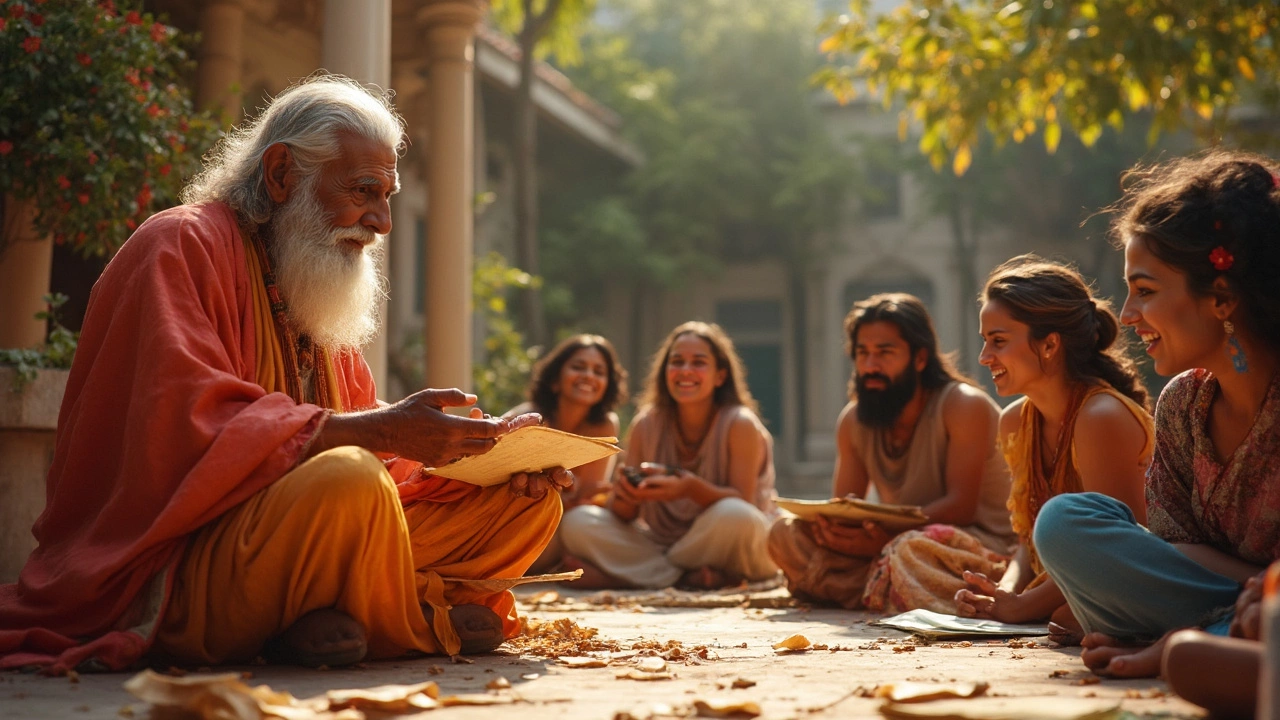
Ever hear a saying that just hits home and sticks with you for years? Indian culture is packed with those. People have used these quotes for centuries to guide their choices, lift their spirits, and get through rough patches. The cool part? These sayings break down big life lessons into a handful of easy words.
Let's face it, life gets messy. So, having a wise saying ready—something like "Truth alone triumphs"—can be a game changer when you're unsure what to do. Whether it's a classic from ancient texts or something your grandmother always said, these words have shaped how people think, act, and even love.
You don't need to be a philosopher to use these sayings. They work in everyday life—helping with work stress, family drama, or just finding the motivation to start your day. Want to know how to put them to work and remember them when you actually need them? Let's get practical about what makes these Indian sayings so powerful.
- What Makes an Indian Saying 'Great'?
- Wisdom Passed Down: Ancient Proverbs
- Modern India: Quotes That Move Us Today
- Putting Wisdom Into Practice
- Handy Tips for Remembering and Using Sayings
What Makes an Indian Saying 'Great'?
Not every quote qualifies as a great Indian saying. The best ones pack real wisdom, hit home for people across generations, and work even when times change. Why do some lines from India’s past still pop up everywhere from textbooks to movie scripts? Let’s break it down.
First, a great Indian saying gets straight to the point. Even ancient quotes—from the Vedas, Upanishads, or famous proverbs—use plain words that most people can relate to. For example, “Ahimsa paramo dharmah” (Non-violence is the highest duty) is clear and powerful even if you hear it for the first time.
Next, the best sayings usually have a universal message. You’ll see advice about honesty, hard work, and resilience repeated over centuries. They aren’t just about religion or tradition—they actually help with stuff like friendships, business, or raising kids. This is why something like “Satyameva Jayate” (Truth alone triumphs), now India’s national motto, connects with people of all backgrounds.
- Indian sayings are brief but pack a punch.
- They fit both daily life and big decisions.
- They’re not stuck in the past—they still make sense now.
Some sayings make such a big impact that they land on the Indian currency, show up in government mottos, or get quoted by leaders in Parliament. Take this simple stat:
| Saying | Where You See It | Origin |
|---|---|---|
| Satyameva Jayate | Indian currency, national emblem | Mundaka Upanishad |
| Ahimsa Paramo Dharma | School books, speeches | Mahabharata |
| Unity in Diversity | Political speeches, textbooks | Modern India |
One more thing, great sayings are easy to remember. Usually, you’ll hear them in movies, at family gatherings, or even written on street walls. People trust them because generations have found these words useful, not just pretty.
The short version? If a saying makes sense across ages and cultures, is easy to remember, and feels like advice your grandma would actually give, it earns its place in India's hall of fame for quotes.
Wisdom Passed Down: Ancient Proverbs
India's collection of ancient proverbs is like a toolkit for life. These short sayings often come from old Sanskrit texts like the Vedas, Upanishads, and even everyday folk wisdom that's traveled through villages for hundreds—sometimes thousands—of years. They weren’t just made up for fun. People used them to teach kids, settle arguments, and make sense of confusing times.
One classic line, “Ahimsa paramo dharmah” (Nonviolence is the greatest duty), isn’t just a Gandhi slogan—it actually started in the ancient epic, the Mahabharata. It’s shaped how people here think about conflict and peace, even today. Another common one: “Atithi Devo Bhava,” which means “The guest is like God,” guides how families treat visitors, making Indian hospitality kind of famous worldwide.
You’ll also see proverbs about patience, honesty, and respect for elders. For example, “Satyameva Jayate”—that’s “Truth alone triumphs”—got picked as India’s national motto and you’ll spot it on the country’s currency. This isn’t just history; it pops up all the time in conversations, movies, and even social media moments.
- “Vidya Dadati Vinayam” – Learning gives humility. Still used by teachers to remind students that knowledge isn’t just about grades, it’s about character.
- “Dharma Rakshati Rakshitah” – Those who protect righteousness are in turn protected by it. A reminder of karma and responsibility, straight from ancient law books.
- “Jaisa karoge, waisa bharoge” – You reap what you sow. The kind of thing Indian parents might say if you skip chores or slack off at school.
So why do these ancient sayings matter? Mainly, they make big ideas easy to remember and share. The best part is, you’ll hear people from all backgrounds use them—students, elders, even total beginners at Hindi.
Next time you hear a classic Indian proverb, know that it’s more than just words. It’s advice that has already helped generations handle everything from family drama to tough life choices. Call them lifehacks, ancient style.

Modern India: Quotes That Move Us Today
Indian sayings aren’t stuck in the past. Some of the most powerful words shaping India right now come from people living today. These modern quotes stand out because they speak to the highs and lows most of us feel—dreaming big, working hard, and handling failure. They’re everywhere: social media, speeches, even school walls.
Take APJ Abdul Kalam, for example. He’s not just the former President of India—he’s the guy behind, “Dream, dream, dream. Dreams transform into thoughts and thoughts result in action.” You see this quote taped to the mirrors of college students and in office cubicles. It’s simple, but it tells you to start with a dream if you want to get anywhere.
Another one that gets tossed around a lot comes from Mahatma Gandhi: “Be the change you wish to see in the world.” You don’t need to read three books to get it. Just reading it once can make you stop and think about the choices you make every day, whether it’s about climate, kindness, or justice.
Here are a few more modern Indian sayings that hit home for a lot of people:
- “Success is no accident. It is hard work, perseverance, learning, studying, sacrifice and most of all, love of what you are doing.” — adapted by cricketer Pele but popularized in Indian locker rooms and sports academies.
- “When you focus on the good, the good gets better.” — Often quoted by wellness coaches and young business leaders across India today.
- “Small aim is a crime.” — Another Kalam gem, used in classrooms to push kids to think bigger.
What’s so cool about these Indian sayings is that they fit pretty much any kind of daily situation. You can use them to get through a tough day at work, pump yourself up before exams, or even guide your friends when they’re struggling. If you want to really live by these quotes, write them somewhere you’ll see them—your phone lock screen, a sticky note on your fridge, or your desktop wallpaper. It’s simple, but it works.
The reason these sayings work is that they come from people who have walked the walk, not just talked. They sound straightforward, but the impact sticks. The next time you hear one of these quotes, maybe let it be more than just noise. Try testing its message in real life, and see if it helps you get where you want to go.
Putting Wisdom Into Practice
Honestly, hearing an inspiring line is only part of the story. What really counts is using them in your life, where the real magic happens. Indian sayings aren’t just for old books or family gatherings—they can actually make a difference when you deal with stuff like work pressure, disagreements at home, or tough decisions.
Take “Truth alone triumphs” (Satyameva Jayate). This phrase isn’t just India’s national motto; it’s used everywhere from currency to school walls because it reminds people to stick to honesty, even when it’s hard. It’s a simple promise, but using it can help earn trust at work or in relationships. Businesses in India have even used it to build a culture where honesty becomes the norm.
Or look at “All is one” (Vasudhaiva Kutumbakam), which shows up in Indian Parliament and even stamp designs. It pushes the idea that everyone’s connected, which can actually help when you’re dealing with teamwork. People who keep this idea in mind tend to be more open to feedback and less likely to get stuck in arguments.
Want to make these sayings work for you? Here are some easy ways:
- Indian sayings are great for reminders. Stick a sticky note on your laptop or mirror with your favorite quote.
- Try using one as a password or the background on your phone. That way, you see it every day.
- When you’re stuck, ask yourself if any quote fits the situation. It helps you zoom out and see things more clearly.
- If you lead a team, open meetings with a short saying—it’s a solid way to get people focused and motivated.
Even schools in India start the day with a thought or proverb. It’s a tiny step that sets the mood and teaches kids about honesty, hard work, or respect, way before the actual lesson starts.
The bottom line? Don’t just read the sayings for fun. The more you bring them into your day-to-day, the more they can help with real issues—big or small.

Handy Tips for Remembering and Using Sayings
So, you’ve come across some great Indian sayings but keep forgetting them when you need them most. It happens to everyone! The trick is to fit these quotes into your daily life, not just treat them as cool lines from a book.
- Stick Them Everywhere: Try putting up sticky notes on your mirror, fridge, or laptop with your favorite sayings. Research by the University of California found that frequent visual reminders can boost memory by up to 40%.
- Say Them Out Loud: Repeating a saying out loud helps lock it into your brain. Plus, it’s easier to recall phrases you’ve actually spoken.
- Connect Them To Real Situations: Next time you hit a challenge, pick a saying that matches and talk about it with friends or family. That link between words and real-life events makes it stick.
- Use Phone Reminders: Set a daily alert featuring a favorite quote. It’s quick, tech-friendly, and keeps wisdom front and center.
- Teach Someone Else: When you explain a saying to someone (like your kids or even a coworker), it gets anchored in your mind for good. Studies show teaching is one of the fastest ways to learn and recall information.
Check out this quick glance at what helps people remember quotes best:
| Method | Memory Boost (%) |
|---|---|
| Visual Reminders | 40 |
| Verbal Repetition | 35 |
| Relating to Real Life | 30 |
| Teaching Others | 50 |
| Phone Reminders | 25 |
And don’t just remember these sayings—use them. Toss one into a WhatsApp group when someone needs cheering up. Pop a quote into your presentation at work. Or drop a line during a family chat. Seeing the impact these quotes have on others will remind you just how powerful a few simple words can be.